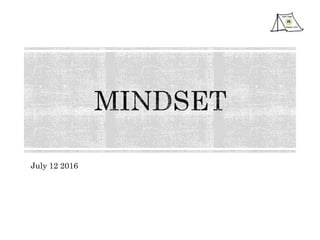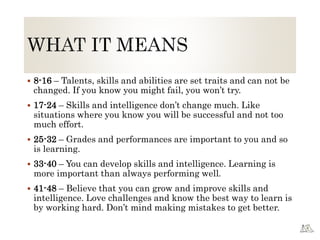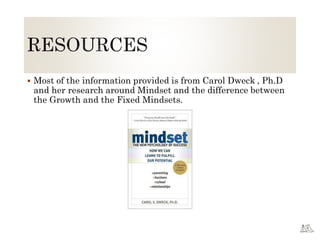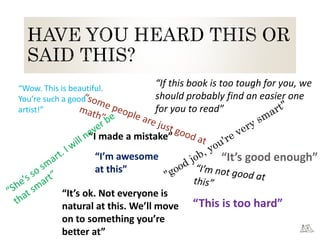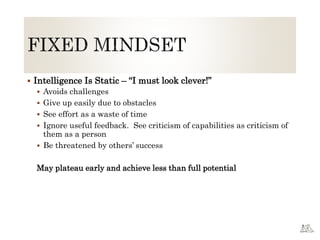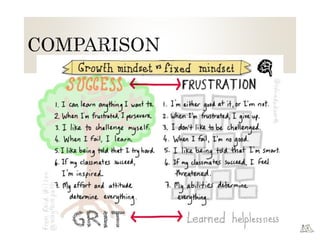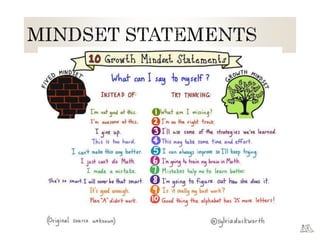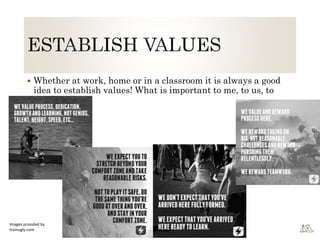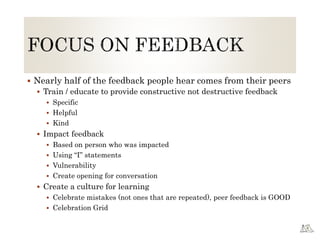Agile camp2016 mindset
- 1. July 12 2016
- 2. MINDSET
- 3. Take a minute or 2 to answer the questions on the sheet Add up all answers from left and right column for a grand total BE HONEST INDIVIDUAL ACTIVTY Check Up provided by trainugly.com
- 4. 8-16 – Talents, skills and abilities are set traits and can not be changed. If you know you might fail, you won’t try. 17-24 – Skills and intelligence don’t change much. Like situations where you know you will be successful and not too much effort. 25-32 – Grades and performances are important to you and so is learning. 33-40 – You can develop skills and intelligence. Learning is more important than always performing well. 41-48 – Believe that you can grow and improve skills and intelligence. Love challenges and know the best way to learn is by working hard. Don’t mind making mistakes to get better.
- 5. Most of the information provided is from Carol Dweck , Ph.D and her research around Mindset and the difference between the Growth and the Fixed Mindsets.
- 6. “In a fixed mindset students believe their basic abilities, their intelligence, their talents are just fixed traits. They have a certain amount and that's that, and then their goal becomes to look smart all the time and never look dumb.” “In a growth mindset students understand that their talents and abilities can be developed through effort, good teaching and persistence. They don't necessarily think everyone's the same or anyone can be Einstein, but they believe everyone can get smarter if they work at it.”
- 7. “I’m awesome at this” “I made a mistake” “It’s ok. Not everyone is natural at this. We’ll move on to something you’re better at” “If this book is too tough for you, we should probably find an easier one for you to read” “Wow. This is beautiful. You’re such a good artist!” “This is too hard” “It’s good enough”
- 8. Intelligence Is Static – “I must look clever!” Avoids challenges Give up easily due to obstacles See effort as a waste of time Ignore useful feedback. See criticism of capabilities as criticism of them as a person Be threatened by others’ success May plateau early and achieve less than full potential
- 9. “This is going to take some time and effort” “Mistakes help me improve” “I can tell you worked very hard at this.” “Seek Challenges” “You should be very proud of yourself” “It’s OK to say “I can’t do it yet””
- 10. Intelligence is expandable – “I want to learn more!” Embraces challenges Persists in the face of setbacks Sees effort as the way Learns from criticism Finds lessons and inspiration in the success of others Reach ever-higher levels of achievement Yoda and Luke
- 13. You are in luck…!!!! You always have the opportunity to go from a fixed mindset to a growth mindset. You can change… How you react to feedback How you receive and provide praise How you may look at a challenge How you will dedicate yourself and persist How you react to failure
- 15. Whether at work, home or in a classroom it is always a good idea to establish values! What is important to me, to us, to you!!! Images provided by trainugly.com
- 16. Nearly half of the feedback people hear comes from their peers Train / educate to provide constructive not destructive feedback Specific Helpful Kind Impact feedback Based on person who was impacted Using “I” statements Vulnerability Create opening for conversation Create a culture for learning Celebrate mistakes (not ones that are repeated), peer feedback is GOOD Celebration Grid
- 18. About being Agile, not just doing Agile It is time to change our Thinking, not our Process (Scrum, Kanban, etc.) Processes and tools will evolve out of Agile Mindset Solving problems will evolve out of Agile Mindset Embrace Change The way you talk, the words you use, the stories you tell, the pictures you draw Practicing the practice Stay the course through crisis Forbes – The Key Missing Ingredient in the Agile Manifesto
- 19. This is a Process to be practiced What it means to be a learner Abraham Lincoln said, “I do not think much of a man who is not wiser today than he was yesterday.” Try Everything
Editor's Notes
- All things that foster a Fixed Mindset. They create the idea that effort isn’t worth it
- Reluctant to take on challenges Believe that talent alone creates success Prefer to stay in their comfort zone Fearful of making mistakes Thinks it is important to ‘look’ smart in front of others Believes that talents and abilities are set in stone, you either have them or you don’t!
- Talents can be developed and abilities can be built over time View mistakes as an opportunity to develop Resilient Effort creates success Think about how they learn
- These examples have a growth mindset. They took failure/criticism and did something with it Think about your failures and how it affected you? Did it define you or did you learn from it and try again?
- Helpful (process focused)
- Should ALL FAILURES be celebrated? No! Learn from failures. Once you have the outcome of your experiment, you can determine where it fits in the celebration grid - experiments may result in success or failure. Either way, learning occurs, and that’s the point….that’s a victory to celebrate! Successful experiments repeated become practices to be celebrated? Failed experiments, repeated, are mistakes, not to be celebrated (why do you keep doing that?!). The point is where the learning occurs and what you do with that knowledge.
- Connections with customers and solving their problems evolved Harvard Business Review embracing Agile
